Key takeaways:
- Cannabis edibles provide a unique consumption experience, with effects that come on gradually and last longer compared to smoking or vaping.
- Legal considerations are crucial; understanding local laws, labeling requirements, and age restrictions is essential for safe practices with cannabis edibles.
- Effective research involves using reputable sources, engaging with local cannabis communities, and staying updated on legal changes to better navigate the cannabis landscape.
- Connecting with legal professionals and advocacy groups can enhance understanding and empower consumers regarding cannabis regulations and their rights.
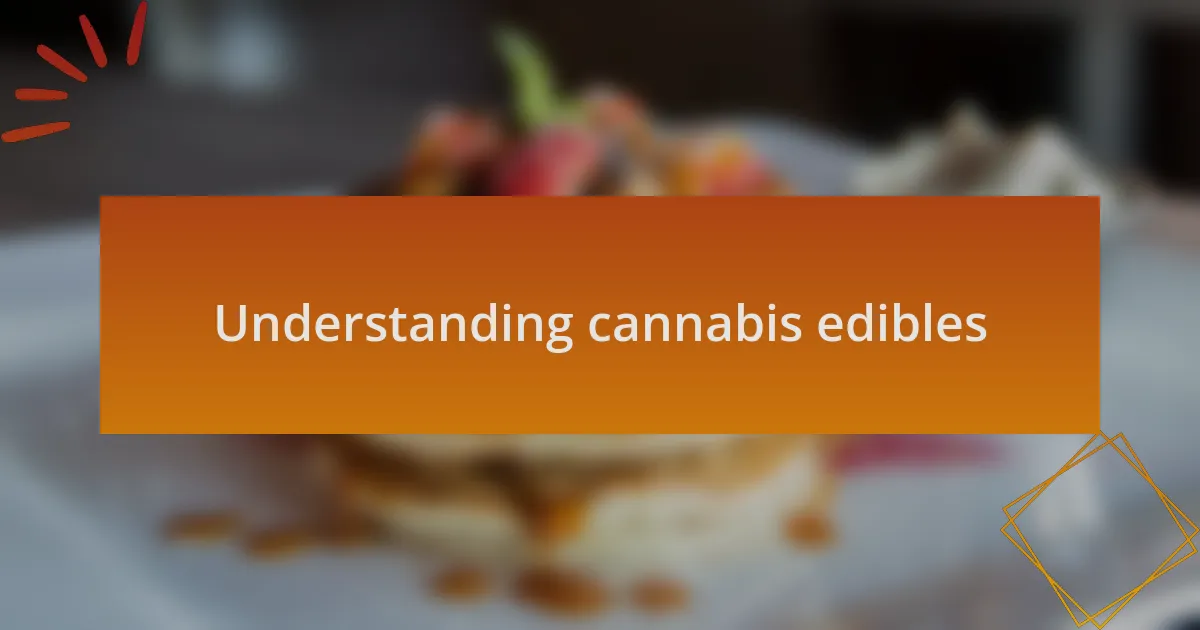
Understanding cannabis edibles
Cannabis edibles are fascinating because they offer a unique approach to consuming cannabis. Unlike smoking or vaping, edibles deliver THC (the psychoactive component) through the digestive system. I remember my first experience with a cannabis-infused brownie; it was both exciting and nerve-wracking. How would it compare to my usual method of consumption?
What set cannabis edibles apart for me was the extended onset time and duration of effects. Typically, I found the experience to be much more gradual; it can take anywhere from 30 minutes to two hours to feel the effects. I learned that patience is crucial. Have you ever waited so long for something only to be surprised by the intensity when it finally arrived? That surge can be unexpectedly powerful.
Another layer to understand is the dosing of edibles. Unlike other forms of cannabis, where the dosage can be somewhat intuitive, I found it essential to be cautious with edibles. A typical serving might contain 5 to 10 mg of THC, but I learned the hard way that it’s easy to underestimate how potent they can be. Have you ever taken too much of something, only to wish you had slowed down? It’s a classic case of “less is more,” especially for newcomers.
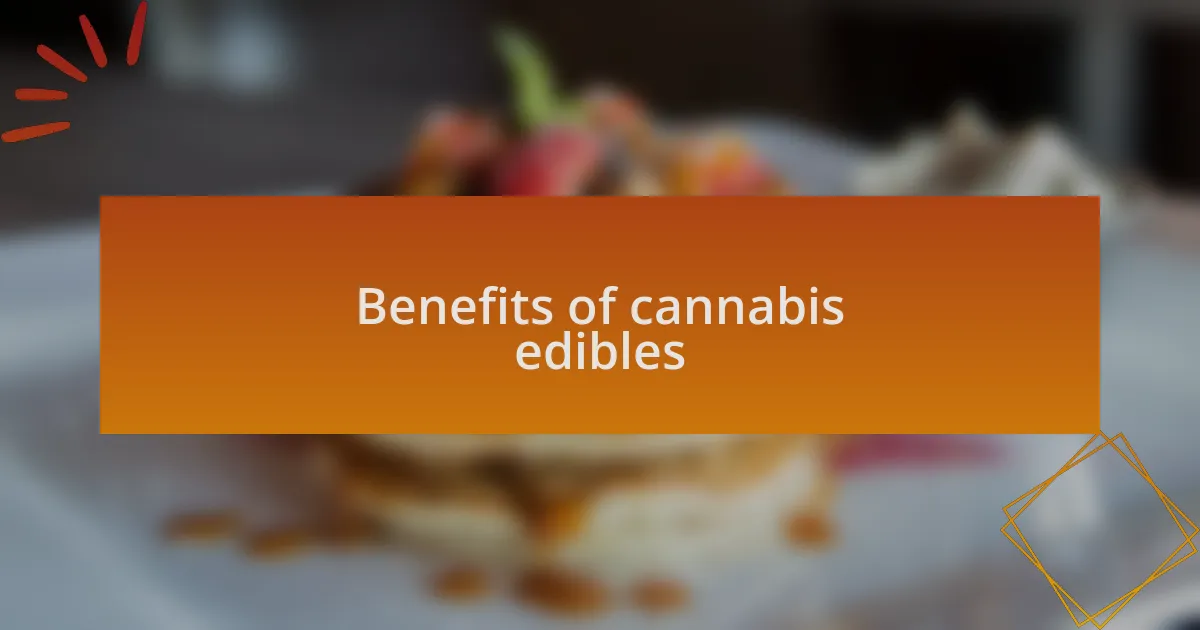
Benefits of cannabis edibles
Cannabis edibles come with quite a few benefits that can pleasantly surprise consumers. One potent advantage is their ability to provide long-lasting relief. I recall a time when I opted for a cannabis-infused gummy instead of my usual method. The effects lingered for several hours, allowing me to unwind without constantly re-dosing. Have you ever wished for a more stable experience? With edibles, that stability is often a welcome change.
Another benefit is the discretion that edibles offer. I often find myself in settings where smoking or vaping isn’t ideal—think family gatherings or public events. During one such occasion, I discreetly enjoyed a chocolate bar, and no one was the wiser. It felt liberating to savor the benefits without the stigma or concern about smoke. Isn’t it refreshing when you can enjoy something without making it the center of attention?
Moreover, these treats can also enhance the whole experience of consuming cannabis. The diverse flavors available can make ingesting cannabis feel more indulgent and enjoyable. A friend once shared some homemade cannabis-infused coconut macaroons with me, and the delightful taste combined with the effects was a game-changer. Do you enjoy trying new flavors? With cannabis edibles, every bite can be an adventure, making it not just about the effects, but a culinary experience too.
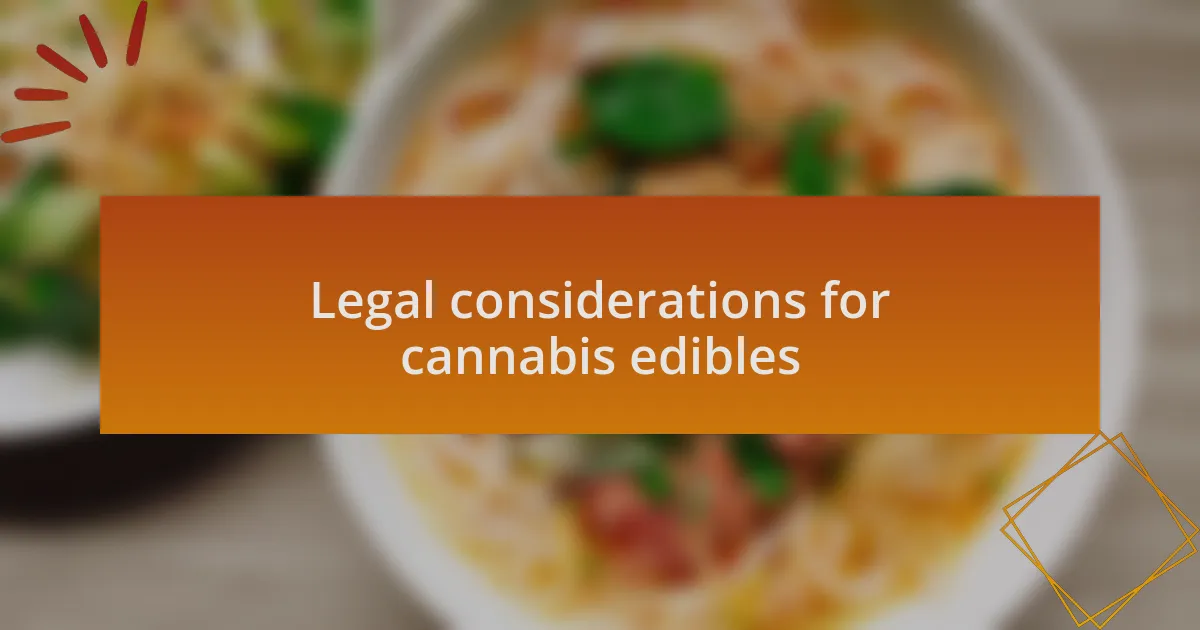
Legal considerations for cannabis edibles
Navigating the legal landscape of cannabis edibles can feel overwhelming. For instance, I remember the first time I tried to determine the legality of making my own infused treats. Each state has its own regulations regarding production, distribution, and consumption, and I found it essential to familiarize myself with those local laws to avoid any unwelcome surprises. Have you ever wondered what happens if you’re caught with something that’s illegal in your area?
Moreover, labeling requirements for cannabis edibles cannot be overlooked. I learned firsthand how crucial it is to understand the importance of clearly marked dosages and ingredients. One time, I shared a batch of homemade edibles, and while the flavors were fantastic, I made sure to emphasize their potency and effects to my friends. It struck me then how vital transparency is—not just for legal reasons, but for the safety and enjoyment of those consuming the product. Don’t you think knowing exactly what you’re eating is important?
Another consideration is the age restrictions on cannabis edibles. This aspect took me by surprise when I first started my research. Each jurisdiction has its own legal age for consumption, often set at 21, similar to alcohol. For people like my younger cousin, who were eager to join the edible experience, it was disappointing but necessary to reinforce these laws. After all, ensuring responsible usage among younger populations reflects a commitment to safety and health, wouldn’t you agree?
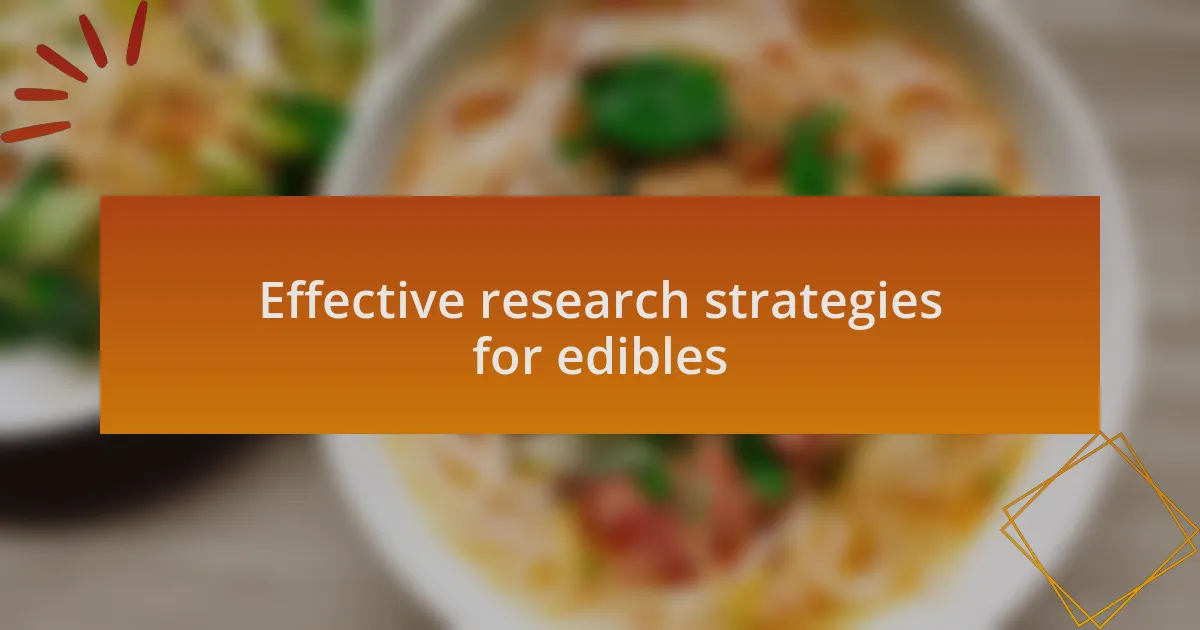
Effective research strategies for edibles
When diving into effective research strategies for cannabis edibles, I found that starting with reputable sources is key. While exploring online databases and scholarly articles, I felt a sense of relief knowing I was consulting materials from established institutions. Have you ever stumbled upon outdated information? It can be frustrating, especially in such a rapidly changing field as cannabis.
I also discovered the significance of connecting with local cannabis communities and forums. Engaging with fellow enthusiasts not only provided me with invaluable insights but also sparked intriguing discussions about new trends and legal nuances. Isn’t it fascinating how sharing personal experiences can illuminate complex topics? I can’t tell you how many tips I gathered just from casual conversations at local cannabis events.
Additionally, I realized that keeping an eye on regulatory updates is critical. Tracking changes in legislation helped me stay informed and better prepared for any shifts affecting edibles. Once, I missed a small amendment regarding THC limits and found myself in a bind when creating a recipe for a friend’s birthday party. It taught me to always stay proactive in my research. What strategies have you found helpful in staying updated?
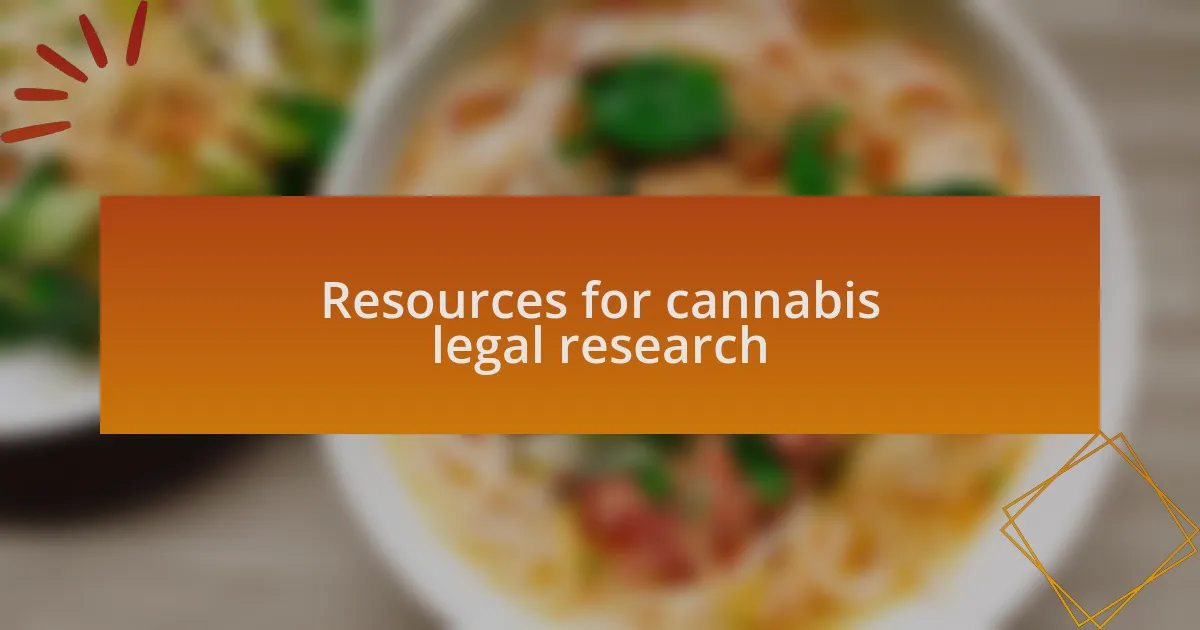
Resources for cannabis legal research
When it comes to legal research on cannabis, I often turn to government websites and legal databases for the most accurate information. The clarity of regulations can vary widely from state to state, and I’ve found that consulting resources like state legislative websites doesn’t just save time; it also provides a solid foundation for understanding local laws. Have you ever navigated through a maze of legal jargon? It can be daunting, but these resources often break it down into more digestible information.
Another vital resource I’ve tapped into is legal journals and publications. For instance, I once came across a detailed article discussing the implications of recent court rulings on cannabis edibles. It was eye-opening, as it connected the legal dots between legislation and real-world applications. Reading such analyses made me appreciate the intricate relationship between law and the evolving cannabis industry. Who knew legal concepts could have such palpable effects on what we consume?
Lastly, networking with legal professionals who specialize in cannabis law has proven invaluable. I remember attending a webinar led by a cannabis attorney, and it was like a light bulb went off for me. The insights shared about compliance requirements were not only practical but inspiring. I encourage you to seek out such opportunities; connecting directly with experts can offer perspectives that you won’t find in textbooks or articles. Have you explored this avenue yet?
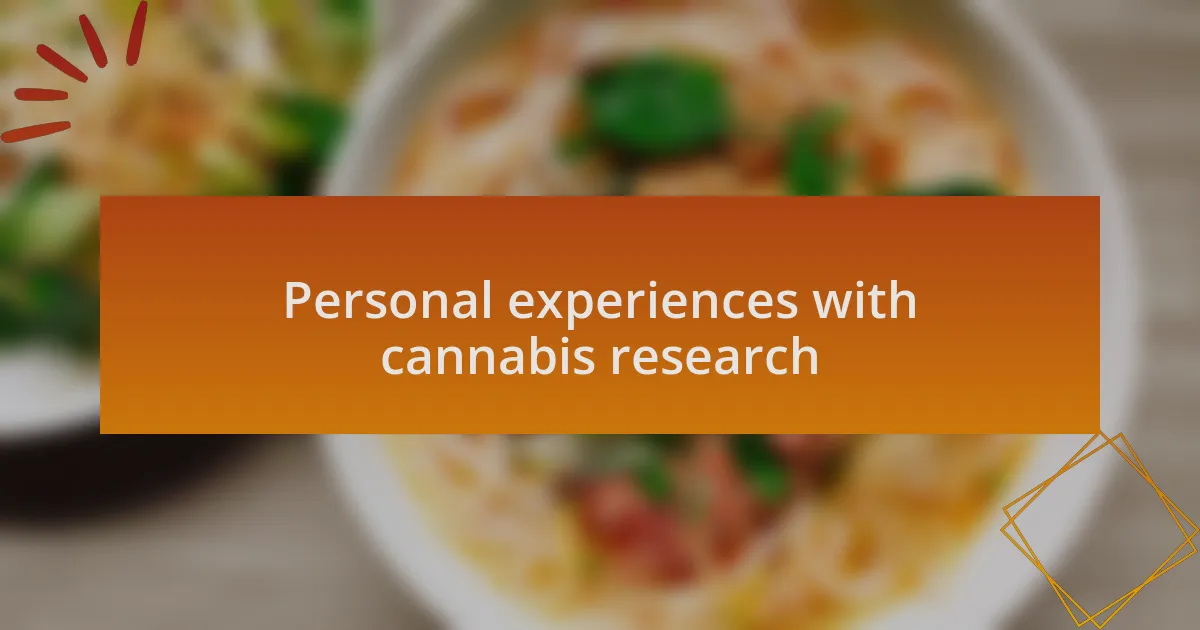
Personal experiences with cannabis research
When diving into cannabis research, I’ve often found myself lost in a whirlwind of information. I remember sifting through countless articles late one night, feeling overwhelmed by the sheer volume of contradictory opinions and data. It was during those moments that I learned the importance of focusing on reputable sources. Have you ever felt that rush of clarity when you finally stumble upon a well-researched piece? It’s like striking gold in a field of gravel.
One particular experience stands out where I decided to join an online community dedicated to cannabis law. Interacting with individuals who were just as eager to learn made all the difference. I shared my confusion about varying state laws and received personal stories from others who had navigated similar challenges. The camaraderie made the legal complexities feel less isolating. Can you relate to that sense of community when tackling tough topics?
I also vividly recall a workshop I attended on cannabis regulations that unexpectedly reignited my passion for research. The speaker shared firsthand cases of how legislation has shaped the cannabis edible market, illuminating aspects I had never considered before. Sitting in that room, I felt a surge of motivation to dig deeper into the practical implications of the law. It made me wonder: how can we, as consumers and advocates, empower ourselves with knowledge in such a rapidly evolving field?
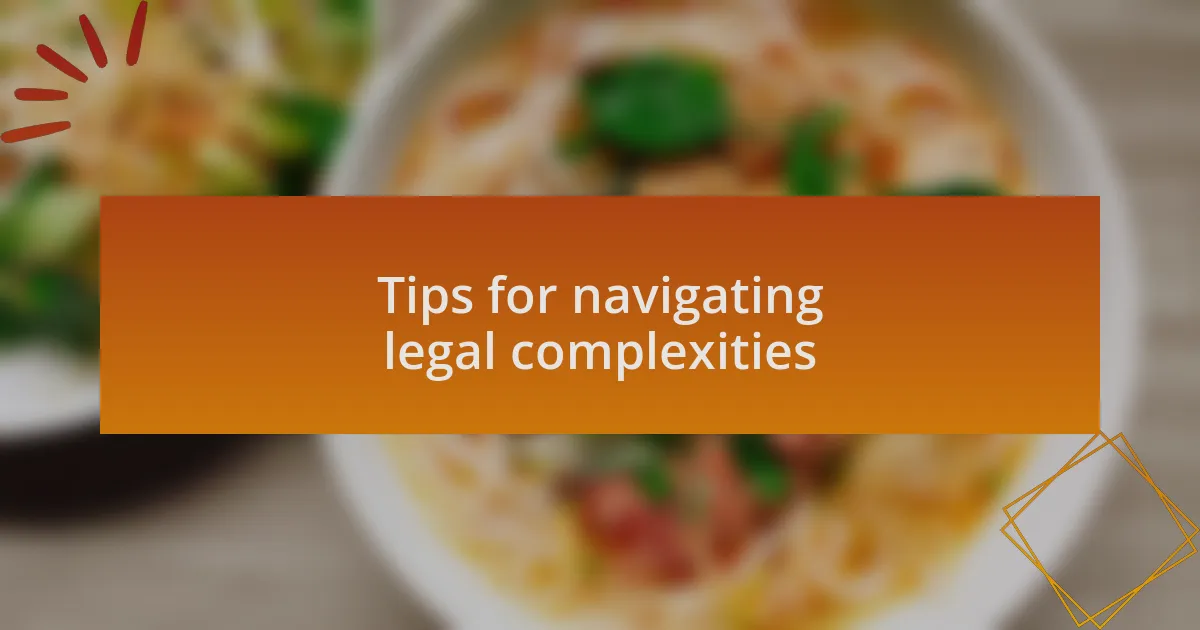
Tips for navigating legal complexities
Navigating the legal complexities of cannabis edibles requires a strategic approach. One strategy I discovered is to create a checklist of essential legal requirements for my state. Each time I pondered starting a new project, I would refer to this list, which granted me the clarity and confidence needed to proceed without feeling overwhelmed by the intricacies of regulations. Have you ever thought about how such a simple tool could empower your research?
Another layer of complexity is understanding local versus federal laws. I remember attending a local event where a seasoned attorney shared stories of clients who mistakenly assumed state law would protect them against federal scrutiny. These anecdotes reinforced the importance of being fully informed about the entire legal landscape. It made me realize that one misstep could lead to significant consequences, something I never want to overlook. How often do you double-check the legal status of your resources?
Finally, I found value in connecting with local advocacy groups. While researching cannabis laws, I joined one that was focused on educating the community about legal rights. The mix of personal experiences shared in that environment opened my eyes to different interpretations of the law and the nuances that can vary by location. This connection personalized the often abstract legal jargon, making me feel more engaged and motivated to take my knowledge beyond the research. Have you connected with a community that reshaped your understanding?